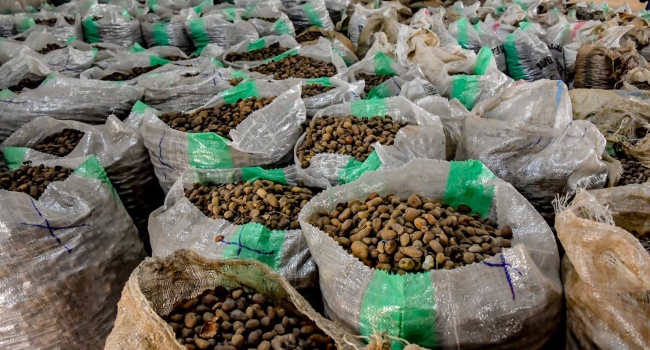
To promote local processing, protect and grow Nigeria’s shea industry, President Bola Tinubu has approved a six-month ban on the export of raw shea nuts.
The ban, which goes into effect right away, is subject to review after its expiration and is specifically intended to boost Nigeria’s shea value chain, which will generate about $300 million annually.
The president’s directive was made known to the Federal Ministry of Finance and other relevant government agencies during a multi-stakeholder meeting held at the Presidential Villa on Tuesday, according to Vice President Kashim Shettima.
Shettima, who spoke about the directive, said it was not an “anti-trade policy” but a “pro-value addition policy” intended to boost rural income and employment for our people.
He thinks that the choice will lead to the transformation of Nigeria from a raw shea nut exporter to a global producer of refined shea butter, oil, and other products.
Read more about Bago’s plan to plant 10m shea trees in Niger.
To promote local processing, promote informal trade, and advance the development and growth of Nigeria’s shea industry, President @officialABAT has approved a temporary six-month ban on the export of raw shea nuts.
The ban, which goes into effect right away, is subject to review when it expires and… twitter.com/ePsCGUxggQ
He claims that the initiative is about promoting gender equality, rural transformation, industrialization, and expanding Nigeria’s global trade footprint.
The Vice President cited opportunities for job creation and income generation as saying, “Nigeria produces nearly 40% of the global shea product, but we only account for 1% of the $6.5 billion market share.
This is unacceptable, they say. In the near-term, we are expected to make about $300 million, and by 2027, that number will increase by tenfold. Our goal is to achieve this.
The ban, according to VP Shettima, was a result of a collective decision between the sub-nationals and the federal government with clear directions for economic transformation in the country’s best interests.
Government “opens opportunities, not closing doors,” he says. Both countries have agreed to prioritize Nigerian shea butter and oil’s availability on the Brazilian market while Mr. President is currently there. The VP stated to the audience in Abuja that this process would be finished in three months.
The vice president emphasized the policy’s gender dimension, noting that millions of women’s livelihoods, dignity, and opportunity are protected by protecting the shea industry.
“We are opening better ones than we are closing them,” he says. We plant the seeds of an industry that will benefit our women, our economy, and Nigeria’s position in global trade for decades to come.
Read more about Shettima’s commitment to increasing oil palm and cocoa production.
Abubakar Kyari, the minister of agriculture and food security, earlier expressed regret over the country’s record of consuming less than one percent of the multi-billion-dollar global shea economy, despite being the world’s largest producer of shea nuts and contributing nearly 40% of the world’s supply.
“Nigeria produces approximately 350, 000 metric tons of shea annually across 30 states, with the potential to reach nearly 900, 000 metric tons. Our market share of the 6.5% of the world’s economy is “less than one percent,” Kyari said.
The evidence that underlies this Presidential Directive was derived from the Rapid Assessment of the Shea Value Chain, which was carried out by the PFSCU, the Federal Ministry of Industry, Trade, and Investment, and in close collaboration with the Federal Ministry of Agriculture and Food Security.
The Minister claimed that the assessment revealed that more than 90,000 tons of raw shea are lost annually in informal cross-border trade despite the country’s “processors operating at only 35 to 50 percent capacity despite a 160, 000 metric tonnes national installed capacity.”
While “regional neighbours like Ghana, Burkinabe, Mali, and Togo have already imposed restrictions on their industries,” said Senator Kyari, Nigeria is vulnerable because it is “the outlier and a hotspot for opportunistic and unregulated buying,” she continued.
The Minister pointed out the enormous potential of the shea trade for Nigeria, noting that the “shea sector” could generate more than 300 million dollars in the near future and help it capture a sizable portion of the world’s projected nine-billion-dollar market by 2030.
Our nation has a comparative advantage over most other commodities, not the least of which. Nigeria’s natural endowment predominates in both value-added processing and production with more than 5 million hectares of wild-growing shea trees.
Shea is also referred to as a strategic non-oil export in our Zero Oil Plan. Nigeria can put itself at the forefront of this expansion, according to Kyari, who predicts a projected global market growth of 6.5 billion dollars today to nine billion by 2030.
The Minister noted that because there are only 90 percent of women who pick and process shea, there will be a direct impact on women’s empowerment, rural job creation, and sustainable livelihoods.
According to him, this aligns with the Tinubu administration’s commitment to empower women and the Federal Ministry of Agriculture and Food Security’s “proposition to support the rural population and to establish a pathway for national economic development.”
Senator Kyari continued, “This presidential directive has clear justifications.” Without corrective measures, Nigeria ran the risk of undermining our processors’ capacities, disempowering rural women, and squandering billions in potential export revenues.
The PFSCU rapid assessment, which involved more than 2, 000 pickers and 65 processors, demonstrated the urgent need for action. Our domestic supply is being sucked out by our informal exports, which are thought to be 90,000 metric tons annually.
Nigeria was positioned as the region’s raw depot because neighboring countries like Mali, Burkinabe, and Togo already impose restrictions on raw exports. The temporary ban’s benefits are equally compelling.
Source: Channels TV

Leave a Reply